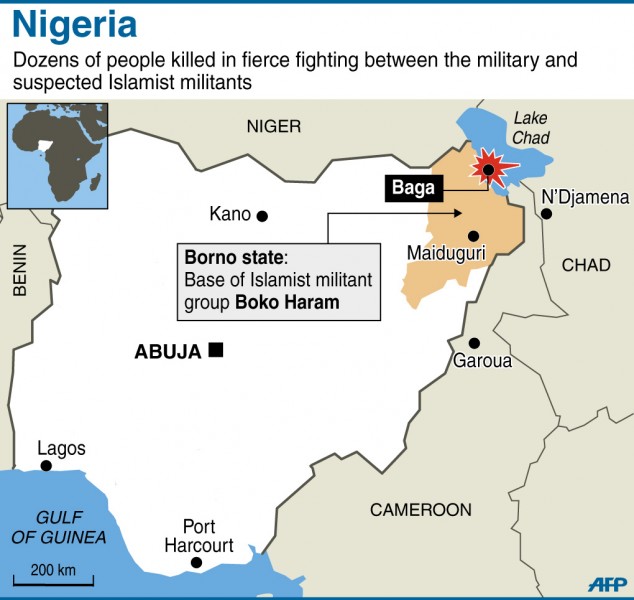
Nigerian President Goodluck Jonathan has ordered a “full-scale” probe into the clashes, a statement from his office said.
“Having received preliminary briefings from the military high command on the incident, President Goodluck Jonathan has ordered a full-scale investigation into reports of high civilian casualties in the confrontation between Nigerian soldiers and insurgents at Baga,” it said.
The bloodshed that began Friday in the remote northeastern town of Baga also left 77 people injured and likely marks the single deadliest event in the insurgency of Boko Haram, the radical Islamist group blamed for scores of attacks in northern and central Nigeria since 2009.
Residents and officials said the dead included soldiers, insurgents as well as dozens of civilians.
“So far 187 dead have been buried, while 77 are under admission in hospitals,” Red Cross Spokesman Nwakpa O. Nwakpa told AFP.
More than 300 houses in the fishing town on the shores of Lake Chad were burnt down, he added.
Another rescue official who did not want to be named said “40 percent of the town has been gutted by fire”.
UN leader Ban Ki-moon was “shocked” by the high toll and the “homes destroyed, as a result of violence between military forces and an extremist group” around Baga, his spokesman Martin Nesirky said.
Ban called on “all extremist groups to cease their attacks.”
In Washington, Acting Deputy State Department spokesman Patrick Ventrell said the United States condemns the clashes between troops and Islamist militants “that took the lives of so many innocent civilians in Baga, Borno state.”
While Washington supports Nigeria’s battle against Boko Haram, Ventrell said civilians had to be protected and human rights respected, adding “violent extremism requires more than just a security response”.
More broadly, Nigerian leaders also “have to address these vulnerable communities’ concerns,” Ventrell said.
“They have to do so in not necessarily a heavy-handed way, but in one that is effective and focused on their legitimate economic and political needs in the north as well.”
Ventrell stressed that “Boko Haram exploits legitimate northern grievances to attract recruits and public sympathy.”
However, he could not confirm reports that the militants have been using rocket propelled grenades in their attacks, which could indicate that the group is getting significant help from Al-Qaeda linked groups in the region.
“Clearly, we’re concerned about the context of them trying to have deeper ties with other violent extremists throughout the region,” Ventrell said, adding the US was “watching very closely” how the situation develops.
Baga lies in Borno state, the home base of Boko Haram, but the town had not previously seen heavy fighting.
The Islamists had mostly been concentrated in the state capital Maiduguri, but scores of militants have reportedly fled to remote corners of the state following a crackdown by security forces in the city.
Initial reports suggested that the fighting started when soldiers surrounded a mosque allegedly housing Islamist insurgents.
But a resident told AFP that the clashes began when Boko Haram gunmen attempted to burst into a “viewing center” where locals watch football matches.
Seeing the approaching militants, one started to run, causing the Islamists to open fire.
Nearby troops engaged the gunmen but had to withdraw under fire from heavily armed insurgents. Some resident reports said the militants were armed with rocket propelled grenades.
The troops later returned with significant re-enforcements.
The soldiers then “went on a shooting spree and set homes on fire. They opened fire on anybody within sight. Women, children and the elderly were not spared,” said the resident, who did not want to be named while accusing the military of such violence.
Leading domestic and international rights groups, including Amnesty International and Human Rights Watch, have accused Nigerian soldiers of massive abuses in operations against Boko Haram, including summary executions.
Such allegations have been denied.
The probe will determine whether or not the military complied with the established rules of engagement during the operation, Jonathan’s statement said.
Borno state military spokesman Lieutenant Colonel Sagir Musa has strongly denied earlier reports that nearly 200 people were killed.
“It is unthinkable to say that 185 people died,” Musa told AFP earlier.
Nigeria’s security forces have a history of minimising casualty figures in the conflict with Boko Haram, in a bid to downplay the Islamists’ capacity.
Boko Haram has said it is fighting to create an Islamic state in Nigeria’s mainly Muslim north, but the group’s demands have shifted repeatedly.
The conflict in Africa’s most populous country and top oil producer is estimated to have left about 3,000 people dead since 2009.
Before the violence in Baga, the deadliest day in the Boko Haram crisis came in January last year, when at least 185 people were killed in coordinated attacks in the city of Kano.
Facing mounting political pressure over his inability to end the violence, Jonathan set up a panel last week to study how an amnesty could be offered to the sect.